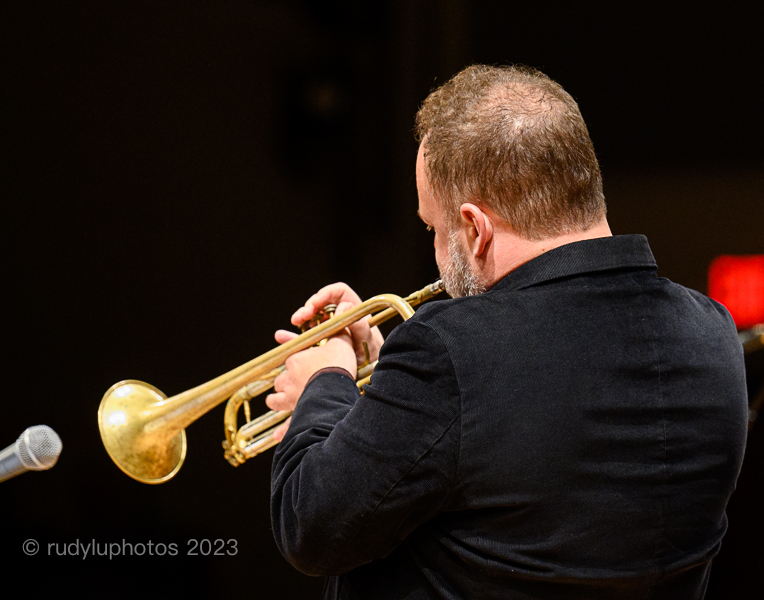Concert Review: Camille Thurman and the Darrell Green Quartet @ A Place for Jazz, 10/06/2023
Camille Thurman came onstage Friday at A Place for Jazz, all elegant four foot nine of her, a silver tenor sax gleaming against her black dress. She played fiery hard bop, uptempo, with off-center phrasing like Eric Dolphy, a robust tone like Dexter Gordon.
And then, and THEN, after two tunes, she put down her tenor and sang, at least as well as she played.
She’s just not fair to other tenor players, or other singers.
Thurman was billed with the Darrell Green Quartet; but two cats different from the program subbed in for Friday: pianist Keith Brown for the guitarist, trumpeter Greg Glassman for Wallace Roney Jr. The rhythm section was her regulars: drummer Green and bassist Tom DeCarlo – whose questing unaccompanied solo led the band into “My Heart Belongs to Daddy” to open. In addition to full-band head statements, then solos, they also linked horns, playing the main melody in harmony runs: different notes, same place; then they played dialogs, taking turns leading and commenting.

It fit together like a tight zipper, through two sets that started with instrumentals, followed by three vocals, each set, too.
“Daddy” did the uptempo, run the changes thing to dazzling perfection: a familiar tune turned inside out, horns charging hard over a punchy beat, launching and ending with bass, all alone. Green co-led with Thurman, DeCarlo and Brown keyed off him—DeCarlo solid and unobtrusive, never playing two notes where one was perfect and Brown forcefully echoing pre-Miles Herbie Hancock. Thurman starred, though, both in “Daddy” and “So Near, So Far,” listening even as she led. In “So Near, So Far,” she grabbed a tasty piano lick from Brown’s solo and played it back at him, then took it through twists and turns of her own.
And then, and THEN, Thurman blew every mind in the place, first time she stepped to the mic. Every boomer in the joint knows Little Anthony and the Imperials 1950s doo-wop classic “I Think I’m Going out of My Head;” but nobody ever heard it like this. While the band played it at maybe one and a half speed, Thurman, lay back behind the beat in a delicious rhythmic contrast, taffy-pulling, teasing, stapling new phrasing into its familiar words and music, skatting all over. Glassman contributed a glorious solo, Brown did, too; then Thurman reclaimed it; a brilliant transformation of familiar words into notes.

“The Nearness of You” was the real heart-breaker, tear-jerker and bluesy bouquet of the first set. Thurman’s vocalese/skat intro opened its wings, stating the first verse by herself. Then the band came in, Glassman last, but best. When Thurman took the wheel again, singing SO high, a red-shirted guy labored down the steps toward the door but stopped, turned around, sat on the stairs and smiled in awe as her voice held him place. The men’s room could wait. Brown was eloquent here in the band’s biggest change of pace from power to pathos.
Thurman testified to her admiration for Sarah Vaughan, introducing “Easy to Love” to complete a one-two ballad punch. She was great in this classic; Glassman was very good, running fast scales before she skatted the coda.
After the break, Green soloed to introduce his own “Despondent’s Flea,” just as DeCarlo opened the first set alone. Green moved from mallets to sticks, toms to cymbals, showing the way to its melody. Thurman linked her tenor to Glassman’s trumpet in conversation, debate, digression, agreement. In harmony and trading licks, they repeated a riff, gathering steam to a hard-stop whose abruptness magnified the song’s power.

The mellower, breezy “Book’s Bossa” brought a change of roles; Thurman’s tenor commenting on Brown’s piano statements at first, then leading as Glassman chimed in gaps between her phrases.
Setting her tenor aside, Thurman honored Horace Silver, singing his invitation “Won’t You Open Your Senses.” Here again Glassman did the duet thing, trumpet and voice talking together. Brown played strong here, evoking Herbie Hancock’s melodic momentum and Horace Silver’s soulfulness in cozy double resonance.
A soft groove ballad – ‘Forever Is a Long Time”? – featured vocal-with-trumpet duets, a striking low-note vocal from Thurman, maybe Brown’s loveliest, most lyrical solo all night and DeCarlo’s first solo since he started the show.
Thurman’s fast, gracefully flowing skat vocal fit Green’s drums, hand in glove. As “Our Day Will Come” formed around them, she brought the crowd into the music with a call-and-response “Yeah!” chant, then opened things up to solos by everybody. Nobody flew further, faster or fiercer than Thurman herself; she both played and sang, with peak eloquence.

Her day, clearly, is here, and now. As a singer, she’s at least level with contemporaries Cecile McLorin Salvant and Samara Joy; and a powerful, lyrical tenor player.
Even after that, though, the only song she both sang and played, she encored with a thrillingly adventurous road song. “Detour Ahead” was all high drama. She flew it from wordless vocal fireworks to start; then came dazzling trumpet runs and a super-lyrical but bluesy piano reverie over tasteful bass and softly brushed drums. It ended, perfectly, with sky-high singing.
“I like to think of being able to sing and play as one complete instrument,” she told J Hunter here after a two-band appearance at Jazz at the Lake. After naming many heroes, she said, “I believe it’s my duty to continue what they started and add to the legacy by being the best I can be at both gifts.”
Amen and amen.
A Place for Jazz continues Friday, Oct. 20 with pianists Emmet Cohen’s Trio, then wraps up Nov. 3 with clarinetist Ken Peplowski’s Swing All-Stars.
A Place for Jazz presents its shows at the Carl B. Taylor Auditorium in the music department of SUNY Schenectady. www.aplaceforjazz.org




















Comments are closed.